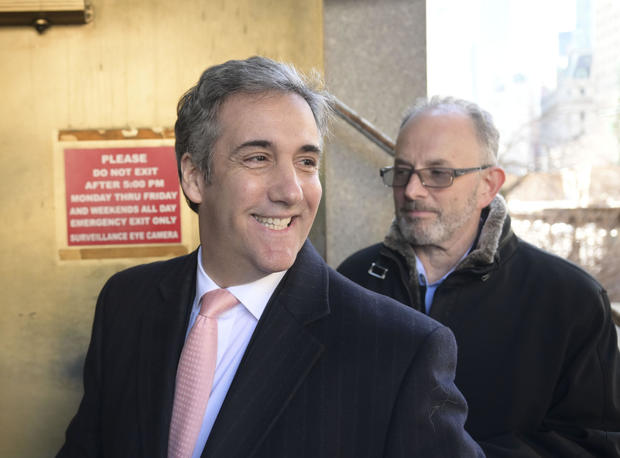Michael Cohen, the one-time personal attorney to former President Donald Trump, testified for the second time Wednesday before a grand jury investigating an alleged “hush money” payment made on Trump’s behalf.
Cohen is a central figure in the investigation. In the final days of the 2016 presidential campaign he paid $130,000 to adult film star Stormy Daniels, for her silence about an alleged affair with Trump.
Fatih Aktas/Anadolu Agency via Getty Images
Cohen has encouraged the investigation, meeting repeatedly with prosecutors this year before his grand jury testimony began on Monday, lasting three hours.
“We’ll see what happens, what questions they ask, and then at the end the grand jurors have the opportunity to ask me questions and I’m looking forward to that,” Cohen said.
The testimony comes about a week after Trump himself was invited to appear before the grand jury, an offer he will not accept, according to Joseph Tacopina, an attorney for Trump.
Daniels shared a tweet from her lawyer, Clark Brewster, that said that she met with the Manhattan D.A.’s office on Wednesday.
“Stormy responded to questions and has agreed to make herself available as a witness, or for further inquiry if needed,” Brewster wrote.
Trump’s legal team and the office of Manhattan District Attorney Alvin Bragg have not communicated since the offer to appear was made, according to Tacopina. In New York, the offer to testify often precedes an indictment.
A spokesperson for Bragg declined to comment Wednesday.
Tacopina criticized the case Monday, saying that “we, and most election law experts, believe (the case) is with absolutely no legal merit.”
Asked by CBS News about Tacopina’s take on the case Monday, Cohen replied, “I think Joe Tacopina needs to take a refresher course.”
The underpinnings for a potential case were described as “novel” by former Manhattan prosecutor Mark Pomerantz in his recent memoir “People vs. Donald Trump: An Inside Account.” Pomerantz said the Daniels payment was indicative of falsifying business records, a misdemeanor that he said could potentially be charged as a felony under New York law if intended to conceal a second crime: in this case, an alleged illegal campaign contribution.
Cohen, who went to prison on federal charges related to the payment to Daniels, described wiring the money through a newly created limited liability company in his memoir, “Disloyal.” He and Daniels have claimed she and Trump signed a non-disclosure agreement in which they used the pseudonyms David Dennison and Peggy Peterson.
Trump denies ever having a sexual relationship with Daniels and has denied wrongdoing. He has called the case “a political Witch-Hunt” and an “old, and rebuked case, which has been rejected by every prosecutor’s office.”
